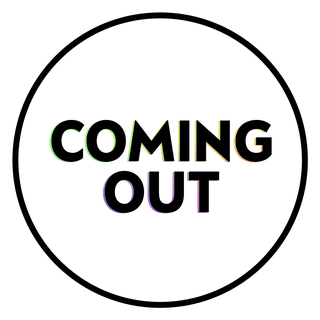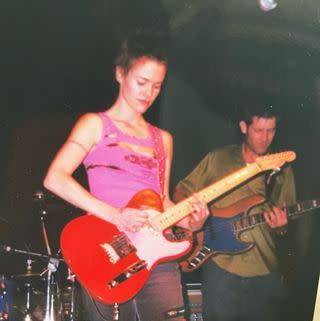Leisha Hailey of “The L Word” Came Out at 19 and Never Looked Back

- Oops!Something went wrong.Please try again later.
- Oops!Something went wrong.Please try again later.
- Oops!Something went wrong.Please try again later.
When the first episode of The L Word aired on Showtime in 2004, there had never been a show quite like it. Sure, there were shows about women discussing their romances over breakfast (see: Sex and the City), and LGBTQ+-centric dramas (like Queer as Folk), but The L Word focused specifically on the lives of lesbians.

And on this show about queer women, Leisha Hailey, who played Alice Pieszecki, a peppy talk show host, was the series' only openly queer cast member (though that later changed—starring in The L Word helped Kate Moenning come into her own identity). Hailey had been out since the age of 19, when she moved from Nebraska to start her life in New York.
Along with costars Moenning and Jennifer Beals, Hailey reprised her character on The L Word: Generation Q, which will return for a third season this year. The L Word: Generation Q pays homage to the original's trailblazing legacy, while acknowledging how much has changed since 2004 for queer people.
Below, Hailey recalls her childhood in Nebraska, coming out as a teenager, and then having to come out all over again when she became a public figure in a time when being gay still made headlines.
I was born in Okinawa, Japan, and raised in Bellevue, Nebraska, a military town outside of Omaha. There were train tracks and a slaughterhouse, flatlands and cornfields, a lot of cows. My dad was in the Air Force, but both of my parents were very liberal, very open-minded. As a kid, I wanted to cut my hair short and wear boys’ clothes; I played sports and loved musical theater. Anything I was into, my parents let me do.
But I always felt different. I never really understood what it was, even though throughout my childhood, I often got called a boy or mistaken for one. It wasn’t until I was in high school, when I fell in love with my best friend, whom I had a secret relationship with, that I began to understand. And that’s when the shame really kicked in. I didn’t know how to deal with it, I thought something was horribly wrong with me, and eventually I had to go to therapy. I didn’t tell my parents why.
Here’s the thing: My mom’s very best friend, who I called Aunt Maureen, was a lesbian, and she was such a huge part of my life throughout my upbringing. She had girlfriends—Kathy would be around for a couple of years, then Louanne was around for a couple of years. My parents’ other best friend was my high school drama teacher who, along with his partner, I’m still close with. I was totally surrounded by gay people growing up, all of them embraced by my family, but what I’ve realized later in life was that, despite these people being big parts of my life, that facet of their lives was kept hidden, unable to be spoken about.
Aunt Maureen, for example, had an extra bedroom in her house that was kept in such a way as to look like she had a roommate, like she wasn’t dating the person she was living with. And even though people knew that my teacher was gay, he could never come out of the closet because, according to those same people, he could get fired. Basically, I was taught that, outside my family and within the larger community, you had to hide this stuff away, even if others knew. I think about this now, because I’m always wondering, Where did I learn shame from? The shame was in the silence, in not allowing people to speak for themselves.
I’m always wondering, “Where did I learn shame from?” The shame was in the silence, in not allowing people to speak for themselves.
I felt it when I was first developing my own sense of who I was. Before I fell in love with my best friend, I’d had crushes on other girls, other women. In third grade, I would get super excited around my math teacher, who I thought was just so cool. When I was in fifth grade, there was this high school girl, CJ, who had short hair and who took me under her wing. I painted her in my art class, literally painted her face, and gave it to her. In retrospect, I can see what these crushes mean, but at the time I didn’t really identify the feeling behind them. I couldn’t.
Even when my friend and I were together, we didn’t talk about it. There was never an attempt to process what was happening. I think part of this was because we were happy. We said “I love you” to each other. We said, “This is special, this is crazy.” It definitely wasn’t what everybody else was doing, so we figured we shouldn’t tell anybody. We kept it to ourselves. I couldn’t tell anyone how happy I was.
She ended up moving away to college while I was still in high school, and I became really depressed. I gained weight. I was quiet. I was heartbroken, crying all the time, but I had no outlet for that pain, so I just buried it. I even got a boyfriend. I thought, I just need to normalize myself and forget this part of me, and one day, I’ll be able to leave Bellevue and become who I really am.
Looking back, I don’t have any resentment toward my hometown. Bellevue was filled with some of the sweetest people. I love that I was raised there, but I couldn’t stay. It was an overwhelming place to be your authentic self.
As I hoped it would, almost everything changed when I moved to New York. I had gotten into this great acting school, the American Academy of Dramatic Arts, and it was like a transformation right out of a movie montage: I cut my hair off, put on oversize Levi’s, and I was feeling myself.
Despite that, however, I was still living a secret life. It was 1989. I would leave school and go down to the original Cubbyhole on Hudson with my older sister’s ID—I was 17, so that’s how I got in—and I would sit at the bar, this private underground world of whispers. It’d be like, 5 o’clock, and I'd be sending women in their 30s beer. I must have looked so little, so alone, but still it felt good to be around people like me.

What pushed me out of the closet finally, what made me fully embrace and celebrate myself, was being embraced and celebrated by the drag queen community. People like Mistress Formika, who’d let my band open for her, taught me to be proud of who I am, to be fabulous, and my whole mindset shifted. For maybe the first time, I thought, I love who I am. Someone had to teach me that, someone had to show me, but once they did, there was no stopping me.
I remember going to the Pride parade and just feeling incredible—all of us shouting about how no one could shut us up. If shame was in the silence, then pride was in celebrating it out loud.
Yet, I still hadn’t told my parents. Even though I was learning to love it so openly, I was scared to show that side of me to them. The fear was that if I lost my parents, lost their love, then I’d have nothing. If I had to deliver horrible news to them, and that news was going to affect my life so badly, I should probably keep it in.
“It was one of the most terrifying things I’ve ever done; of course, it was also one of the best.”
But I didn’t want to do that. After seven months of living in New York City, I made my mother fly out from Nebraska. I’d said to her before she came that I needed to tell her something, and the whole weekend went by with her waiting for me to bring this news up, but I never did. Right before she left for the airport, to go back home to Nebraska, she said to me, “Honey, you have to tell me what’s wrong.” She was worried, watching me cry, and asked, “What is it, honey? Are you on drugs? Are you pregnant? Are you in a cult?” She went through every parent’s worst nightmare, until finally she asked, “Are you gay?” I told her yes, and she laughed. She said, “Are you kidding me? That’s the news?” She then said, “Honey, I love you more than anything in the world.” My announcement had no effect on her love.
Ultimately, she wasn't surprised by it, either. Later we laughed about it, but it was one of the most terrifying things I’ve ever done; of course, it was also one of the best. I had made her go back and tell the rest of the family, which she did, and I thought that was that.
And then my music career started gaining attention, and my sexuality became news. In a way I wasn’t at all prepared for, I was publicly outed. This was before I was on The L Word, where I was the show’s only “out” cast member at the time. I was around 23, and in a band called the Murmurs with Heather Grody.
We did an interview on KROQ radio in California for our first album. We were supposed to talk about our music, but the DJ made it about us. It was like an interrogation. He would not let go. He started with, “What are you into? Who are you into? You like guys, you like girls? Oh wait, I see your face change.”

It felt like we’d been caught. Our record company panicked. After that, we got pigeonholed into being a “gay band,” whatever that means.
But from the second I told my mom, I never hid my sexuality. Even though I was “outed” on the radio, I was already out, always very open about it everywhere and all of the time. To me, if you’re living life that way, you are out, and “coming out” is more about making it clear to other people that they need to understand you. It’s about getting others on your level.
And so, I had the gift of being out, being myself, for my whole time in the public eye. It’s been a relief to say, “This is who I am. This is who I love.”
It’s surreal to know I had a role in helping other people come to that place of acceptance. So many people have told me The L Word played a part in their own awakening. Representation is so important to our community—I know what it’s like to not see yourself, and to so desperately try to find it.
I remember running home to watch reruns of Cagney and Lacey as a kid, just so I could build fantasies around these two characters. Sure, Cagney and Lacey had boyfriends—but their bond struck me, made me think about a relationship like that. Looking back, it seems I was doing the work for Hollywood that it should’ve been doing for me. And now, I get to be part of that.
You Might Also Like
